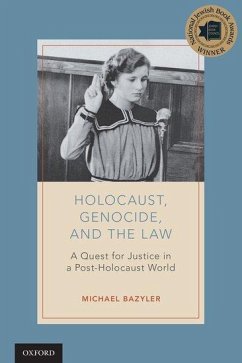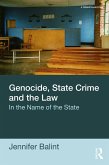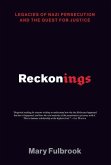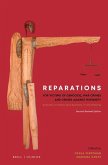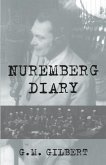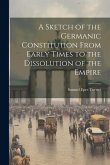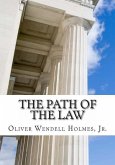- Broschiertes Buch
- Merkliste
- Auf die Merkliste
- Bewerten Bewerten
- Teilen
- Produkt teilen
- Produkterinnerung
- Produkterinnerung
This book examines the background of the Holocaust and genocide through the prism of the law; the criminal and civil prosecution of the Nazis and their collaborators for Holocaust-era crimes; and contemporary attempts to criminally prosecute perpetrators for the crime of genocide. It provides the history of the Holocaust as a legal event, and sets out how genocide has become known as the "crime of crimes" under both international law and in popular discourse. It goes on to discuss specific post-Holocaust legal topics, and examines the Holocaust as a catalyst for post-Holocaust international…mehr
Andere Kunden interessierten sich auch für
![Genocide, State Crime and the Law Genocide, State Crime and the Law]() Jennifer BalintGenocide, State Crime and the Law52,99 €
Jennifer BalintGenocide, State Crime and the Law52,99 €![Reckonings Reckonings]() Mary FulbrookReckonings28,99 €
Mary FulbrookReckonings28,99 €![Reparations for Victims of Genocide, War Crimes and Crimes Against Humanity Reparations for Victims of Genocide, War Crimes and Crimes Against Humanity]() Reparations for Victims of Genocide, War Crimes and Crimes Against Humanity202,99 €
Reparations for Victims of Genocide, War Crimes and Crimes Against Humanity202,99 €![Death and a Maiden Death and a Maiden]() William David MyersDeath and a Maiden18,99 €
William David MyersDeath and a Maiden18,99 €![Nuremberg Diary Nuremberg Diary]() G M GilbertNuremberg Diary20,99 €
G M GilbertNuremberg Diary20,99 €![A Sketch of the Germanic Constitution From Early Times to the Dissolution of the Empire A Sketch of the Germanic Constitution From Early Times to the Dissolution of the Empire]() Samuel Epes TurnerA Sketch of the Germanic Constitution From Early Times to the Dissolution of the Empire22,99 €
Samuel Epes TurnerA Sketch of the Germanic Constitution From Early Times to the Dissolution of the Empire22,99 €![The Path Of The Law The Path Of The Law]() Oliver Wendell Holmes JrThe Path Of The Law11,99 €
Oliver Wendell Holmes JrThe Path Of The Law11,99 €-
-
-
This book examines the background of the Holocaust and genocide through the prism of the law; the criminal and civil prosecution of the Nazis and their collaborators for Holocaust-era crimes; and contemporary attempts to criminally prosecute perpetrators for the crime of genocide. It provides the history of the Holocaust as a legal event, and sets out how genocide has become known as the "crime of crimes" under both international law and in popular discourse. It goes on to discuss specific post-Holocaust legal topics, and examines the Holocaust as a catalyst for post-Holocaust international justice. Together, this collection of subjects establishes a new legal discipline, which the author Michael Bazyler labels "Post-Holocaust Law."
Hinweis: Dieser Artikel kann nur an eine deutsche Lieferadresse ausgeliefert werden.
Hinweis: Dieser Artikel kann nur an eine deutsche Lieferadresse ausgeliefert werden.
Produktdetails
- Produktdetails
- Verlag: Oxford University Press
- Seitenzahl: 394
- Erscheinungstermin: 1. Juli 2017
- Englisch
- Abmessung: 231mm x 155mm x 23mm
- Gewicht: 558g
- ISBN-13: 9780190664039
- ISBN-10: 0190664037
- Artikelnr.: 47864574
- Herstellerkennzeichnung
- Produktsicherheitsverantwortliche/r
- Europaallee 1
- 36244 Bad Hersfeld
- gpsr@libri.de
- Verlag: Oxford University Press
- Seitenzahl: 394
- Erscheinungstermin: 1. Juli 2017
- Englisch
- Abmessung: 231mm x 155mm x 23mm
- Gewicht: 558g
- ISBN-13: 9780190664039
- ISBN-10: 0190664037
- Artikelnr.: 47864574
- Herstellerkennzeichnung
- Produktsicherheitsverantwortliche/r
- Europaallee 1
- 36244 Bad Hersfeld
- gpsr@libri.de
Michael Bazyler is Professor of Law and The 1939 Society Scholar in Holocaust and Human Rights Studies at the Fowler School of Law, Chapman University. He is the author of Holocaust Justice: The Battle for Restitution in America's Courts (2003), Holocaust Restitution: Perspective on the Litigation and its Legacy (co-authored with Roger Alford, 2006), Forgotten Trials of the Holocaust (co-authored with Frank Tuerkheimer, 2014), and numerous articles on international human rights law. He has testified before Congress and his writings have been cited by the United States Supreme Court.
* Introduction
* PART I: THE LEGAL HISTORY OF THE HOLOCAUST AND GENOCIDE
* Chapter 1 The Holocaust: A Legal History
* A. Nazi Germany as a Law-Based State
* B. The Nazis Come to Power Through Law
* C. Legal Measures Against Jews in the Reich
* D. War, Occupation and Ghettoization in Occupied Europe
* E. Extermination: The Legal Holocaust
* F. Aftermath
* Chapter 2 Naming the Crime: Genocide
* A. The Historical Background of the Term Genocide
* B. The Genocide Convention
* 1. Legislative History
* 2. Definition of Genocide
* 3. Actus Reus of Genocide - The Prohibited Acts
* 4. Mens Rea of Genocide: With Intent to Destroy, In Whole or in Part
* 5. Genocide-Related Crimes: Conspiracy, Incitement, Attempt and
Complicity
* 6. Proving Genocide
* 7. Punishment
* C. Use and Misuse of Genocide Terminology
* 1. Using and Misusing the G-word: Why Words Matter
* 2. When Is It Proper to Characterize A Historical Event as a
Genocide?
* Part II: Legal Reckoning with the Crimes of THE HOLOCAUST
* Chapter 3 Prosecution of Nazi War Criminals at Nuremberg
* A. The International Military Tribunal at Nuremberg
* 1. The Rocky Road at Nuremberg
* 2. The Trial
* 3. Major Criticisms of the IMT
* 4. The Holocaust at Nuremberg
* B. The Later Nuremberg Proceedings
* 1. The Twelve NMT Trials
* 2. Noel, Noel, what the hell
* 3. Legacy of the NMT
* Chapter 4 National Prosecutions of Nazi War Criminals
* A. Prosecutions in Germany
* 1. The Ulm Einsatzgruppen Trial
* 2. The Frankfurt Auschwitz Trial
* B. The Trial of Adolf Eichmann in Israel
* 1. Eichmann Before Jerusalem - The Nazi Era
* Eichmann's Escape and Capture
* 2. Eichmann in Jerusalem -The Trial
* 3. Legacies of Trial
* C. Hunting for Nazis in America
* D. Retrospective
* Chapter 5 Civil Litigation for the Financial Crimes of the Holocaust
* A. Stealing From the Jews
* B. Returning What Was Stolen
* 1. Restitution by the Allies in Occupied Germany
* 2. German Reparations to Israel and Survivors
* 3. Holocaust Restitution in the 1990's - A Measure of Justice Fifty
Years Later
* 4. Holocaust Restitution in the 21st Century: The French Railroad
Settlement
* C. Why Didn't the Holocaust Restitution Model Work for Other
Historical Atrocities?
* 1. Herero Genocide Litigation
* 2. Litigation Against Japanese Industry Arising Out of the Second
World War
* 3. South African Apartheid Litigation
* 4. African-American Reparations Litigation
* 5. Armenian Genocide Era Litigation
* 6. Shutting the Door on Universal Jurisdiction: The 2013 Kiobel
Supreme Court Decision
* Chapter 6 Holocaust Denial and the Law
* A. What is Holocaust Denial?
* B. Criminalizing Speech: Holocaust and Genocide Denial Laws in Europe
* C. Should Holocaust Denial Be a Crime?
* D. The Future of Denial Laws
* Chapter 7 The Impact of the Holocaust on Post-Holocaust Legal
Philosophy
* A. Carl Schmitt and the State of Exception
* B. Karl Loewenstein and Germany's Militant Democracy
* C. Gustav Radbruch and the Hart-Fuller Debate: What is "Law"?
* D. The State of Exception After 9/11
* Part III: The Holocaust As A Catalyst For MODERN International
Criminal Justice
* Chapter 8 Nuremberg's Legacy: The UN Tribunals for Yugoslavia and
Rwanda and the International Criminal Court
* A. Building a Better Nuremberg
* B. Creating the Case Law of Genocide
* 1. Joint Criminal Enterprise and Genocide
* 2. Public Incitement to Commit Genocide
* 3. Command Responsibility and Genocide
* C. Criticisms of the ICTs Slow start
* D. Nuremberg and the International Criminal Court
* Chapter 9 Prosecuting Genocide International Prosecutions
* 1.ICTR Prosecutions
* 2.ICTY Prosecutions
* 3.ICC Prosecutions
* B. Domestic Prosecutions
* 1.Nikola Jorgi?: The First Person Convicted of Genocide?
* 2.Rwandan Genocidaires
* Conclusion: Can Genocide Be Prevented?
* Index
* PART I: THE LEGAL HISTORY OF THE HOLOCAUST AND GENOCIDE
* Chapter 1 The Holocaust: A Legal History
* A. Nazi Germany as a Law-Based State
* B. The Nazis Come to Power Through Law
* C. Legal Measures Against Jews in the Reich
* D. War, Occupation and Ghettoization in Occupied Europe
* E. Extermination: The Legal Holocaust
* F. Aftermath
* Chapter 2 Naming the Crime: Genocide
* A. The Historical Background of the Term Genocide
* B. The Genocide Convention
* 1. Legislative History
* 2. Definition of Genocide
* 3. Actus Reus of Genocide - The Prohibited Acts
* 4. Mens Rea of Genocide: With Intent to Destroy, In Whole or in Part
* 5. Genocide-Related Crimes: Conspiracy, Incitement, Attempt and
Complicity
* 6. Proving Genocide
* 7. Punishment
* C. Use and Misuse of Genocide Terminology
* 1. Using and Misusing the G-word: Why Words Matter
* 2. When Is It Proper to Characterize A Historical Event as a
Genocide?
* Part II: Legal Reckoning with the Crimes of THE HOLOCAUST
* Chapter 3 Prosecution of Nazi War Criminals at Nuremberg
* A. The International Military Tribunal at Nuremberg
* 1. The Rocky Road at Nuremberg
* 2. The Trial
* 3. Major Criticisms of the IMT
* 4. The Holocaust at Nuremberg
* B. The Later Nuremberg Proceedings
* 1. The Twelve NMT Trials
* 2. Noel, Noel, what the hell
* 3. Legacy of the NMT
* Chapter 4 National Prosecutions of Nazi War Criminals
* A. Prosecutions in Germany
* 1. The Ulm Einsatzgruppen Trial
* 2. The Frankfurt Auschwitz Trial
* B. The Trial of Adolf Eichmann in Israel
* 1. Eichmann Before Jerusalem - The Nazi Era
* Eichmann's Escape and Capture
* 2. Eichmann in Jerusalem -The Trial
* 3. Legacies of Trial
* C. Hunting for Nazis in America
* D. Retrospective
* Chapter 5 Civil Litigation for the Financial Crimes of the Holocaust
* A. Stealing From the Jews
* B. Returning What Was Stolen
* 1. Restitution by the Allies in Occupied Germany
* 2. German Reparations to Israel and Survivors
* 3. Holocaust Restitution in the 1990's - A Measure of Justice Fifty
Years Later
* 4. Holocaust Restitution in the 21st Century: The French Railroad
Settlement
* C. Why Didn't the Holocaust Restitution Model Work for Other
Historical Atrocities?
* 1. Herero Genocide Litigation
* 2. Litigation Against Japanese Industry Arising Out of the Second
World War
* 3. South African Apartheid Litigation
* 4. African-American Reparations Litigation
* 5. Armenian Genocide Era Litigation
* 6. Shutting the Door on Universal Jurisdiction: The 2013 Kiobel
Supreme Court Decision
* Chapter 6 Holocaust Denial and the Law
* A. What is Holocaust Denial?
* B. Criminalizing Speech: Holocaust and Genocide Denial Laws in Europe
* C. Should Holocaust Denial Be a Crime?
* D. The Future of Denial Laws
* Chapter 7 The Impact of the Holocaust on Post-Holocaust Legal
Philosophy
* A. Carl Schmitt and the State of Exception
* B. Karl Loewenstein and Germany's Militant Democracy
* C. Gustav Radbruch and the Hart-Fuller Debate: What is "Law"?
* D. The State of Exception After 9/11
* Part III: The Holocaust As A Catalyst For MODERN International
Criminal Justice
* Chapter 8 Nuremberg's Legacy: The UN Tribunals for Yugoslavia and
Rwanda and the International Criminal Court
* A. Building a Better Nuremberg
* B. Creating the Case Law of Genocide
* 1. Joint Criminal Enterprise and Genocide
* 2. Public Incitement to Commit Genocide
* 3. Command Responsibility and Genocide
* C. Criticisms of the ICTs Slow start
* D. Nuremberg and the International Criminal Court
* Chapter 9 Prosecuting Genocide International Prosecutions
* 1.ICTR Prosecutions
* 2.ICTY Prosecutions
* 3.ICC Prosecutions
* B. Domestic Prosecutions
* 1.Nikola Jorgi?: The First Person Convicted of Genocide?
* 2.Rwandan Genocidaires
* Conclusion: Can Genocide Be Prevented?
* Index
* Introduction
* PART I: THE LEGAL HISTORY OF THE HOLOCAUST AND GENOCIDE
* Chapter 1 The Holocaust: A Legal History
* A. Nazi Germany as a Law-Based State
* B. The Nazis Come to Power Through Law
* C. Legal Measures Against Jews in the Reich
* D. War, Occupation and Ghettoization in Occupied Europe
* E. Extermination: The Legal Holocaust
* F. Aftermath
* Chapter 2 Naming the Crime: Genocide
* A. The Historical Background of the Term Genocide
* B. The Genocide Convention
* 1. Legislative History
* 2. Definition of Genocide
* 3. Actus Reus of Genocide - The Prohibited Acts
* 4. Mens Rea of Genocide: With Intent to Destroy, In Whole or in Part
* 5. Genocide-Related Crimes: Conspiracy, Incitement, Attempt and
Complicity
* 6. Proving Genocide
* 7. Punishment
* C. Use and Misuse of Genocide Terminology
* 1. Using and Misusing the G-word: Why Words Matter
* 2. When Is It Proper to Characterize A Historical Event as a
Genocide?
* Part II: Legal Reckoning with the Crimes of THE HOLOCAUST
* Chapter 3 Prosecution of Nazi War Criminals at Nuremberg
* A. The International Military Tribunal at Nuremberg
* 1. The Rocky Road at Nuremberg
* 2. The Trial
* 3. Major Criticisms of the IMT
* 4. The Holocaust at Nuremberg
* B. The Later Nuremberg Proceedings
* 1. The Twelve NMT Trials
* 2. Noel, Noel, what the hell
* 3. Legacy of the NMT
* Chapter 4 National Prosecutions of Nazi War Criminals
* A. Prosecutions in Germany
* 1. The Ulm Einsatzgruppen Trial
* 2. The Frankfurt Auschwitz Trial
* B. The Trial of Adolf Eichmann in Israel
* 1. Eichmann Before Jerusalem - The Nazi Era
* Eichmann's Escape and Capture
* 2. Eichmann in Jerusalem -The Trial
* 3. Legacies of Trial
* C. Hunting for Nazis in America
* D. Retrospective
* Chapter 5 Civil Litigation for the Financial Crimes of the Holocaust
* A. Stealing From the Jews
* B. Returning What Was Stolen
* 1. Restitution by the Allies in Occupied Germany
* 2. German Reparations to Israel and Survivors
* 3. Holocaust Restitution in the 1990's - A Measure of Justice Fifty
Years Later
* 4. Holocaust Restitution in the 21st Century: The French Railroad
Settlement
* C. Why Didn't the Holocaust Restitution Model Work for Other
Historical Atrocities?
* 1. Herero Genocide Litigation
* 2. Litigation Against Japanese Industry Arising Out of the Second
World War
* 3. South African Apartheid Litigation
* 4. African-American Reparations Litigation
* 5. Armenian Genocide Era Litigation
* 6. Shutting the Door on Universal Jurisdiction: The 2013 Kiobel
Supreme Court Decision
* Chapter 6 Holocaust Denial and the Law
* A. What is Holocaust Denial?
* B. Criminalizing Speech: Holocaust and Genocide Denial Laws in Europe
* C. Should Holocaust Denial Be a Crime?
* D. The Future of Denial Laws
* Chapter 7 The Impact of the Holocaust on Post-Holocaust Legal
Philosophy
* A. Carl Schmitt and the State of Exception
* B. Karl Loewenstein and Germany's Militant Democracy
* C. Gustav Radbruch and the Hart-Fuller Debate: What is "Law"?
* D. The State of Exception After 9/11
* Part III: The Holocaust As A Catalyst For MODERN International
Criminal Justice
* Chapter 8 Nuremberg's Legacy: The UN Tribunals for Yugoslavia and
Rwanda and the International Criminal Court
* A. Building a Better Nuremberg
* B. Creating the Case Law of Genocide
* 1. Joint Criminal Enterprise and Genocide
* 2. Public Incitement to Commit Genocide
* 3. Command Responsibility and Genocide
* C. Criticisms of the ICTs Slow start
* D. Nuremberg and the International Criminal Court
* Chapter 9 Prosecuting Genocide International Prosecutions
* 1.ICTR Prosecutions
* 2.ICTY Prosecutions
* 3.ICC Prosecutions
* B. Domestic Prosecutions
* 1.Nikola Jorgi?: The First Person Convicted of Genocide?
* 2.Rwandan Genocidaires
* Conclusion: Can Genocide Be Prevented?
* Index
* PART I: THE LEGAL HISTORY OF THE HOLOCAUST AND GENOCIDE
* Chapter 1 The Holocaust: A Legal History
* A. Nazi Germany as a Law-Based State
* B. The Nazis Come to Power Through Law
* C. Legal Measures Against Jews in the Reich
* D. War, Occupation and Ghettoization in Occupied Europe
* E. Extermination: The Legal Holocaust
* F. Aftermath
* Chapter 2 Naming the Crime: Genocide
* A. The Historical Background of the Term Genocide
* B. The Genocide Convention
* 1. Legislative History
* 2. Definition of Genocide
* 3. Actus Reus of Genocide - The Prohibited Acts
* 4. Mens Rea of Genocide: With Intent to Destroy, In Whole or in Part
* 5. Genocide-Related Crimes: Conspiracy, Incitement, Attempt and
Complicity
* 6. Proving Genocide
* 7. Punishment
* C. Use and Misuse of Genocide Terminology
* 1. Using and Misusing the G-word: Why Words Matter
* 2. When Is It Proper to Characterize A Historical Event as a
Genocide?
* Part II: Legal Reckoning with the Crimes of THE HOLOCAUST
* Chapter 3 Prosecution of Nazi War Criminals at Nuremberg
* A. The International Military Tribunal at Nuremberg
* 1. The Rocky Road at Nuremberg
* 2. The Trial
* 3. Major Criticisms of the IMT
* 4. The Holocaust at Nuremberg
* B. The Later Nuremberg Proceedings
* 1. The Twelve NMT Trials
* 2. Noel, Noel, what the hell
* 3. Legacy of the NMT
* Chapter 4 National Prosecutions of Nazi War Criminals
* A. Prosecutions in Germany
* 1. The Ulm Einsatzgruppen Trial
* 2. The Frankfurt Auschwitz Trial
* B. The Trial of Adolf Eichmann in Israel
* 1. Eichmann Before Jerusalem - The Nazi Era
* Eichmann's Escape and Capture
* 2. Eichmann in Jerusalem -The Trial
* 3. Legacies of Trial
* C. Hunting for Nazis in America
* D. Retrospective
* Chapter 5 Civil Litigation for the Financial Crimes of the Holocaust
* A. Stealing From the Jews
* B. Returning What Was Stolen
* 1. Restitution by the Allies in Occupied Germany
* 2. German Reparations to Israel and Survivors
* 3. Holocaust Restitution in the 1990's - A Measure of Justice Fifty
Years Later
* 4. Holocaust Restitution in the 21st Century: The French Railroad
Settlement
* C. Why Didn't the Holocaust Restitution Model Work for Other
Historical Atrocities?
* 1. Herero Genocide Litigation
* 2. Litigation Against Japanese Industry Arising Out of the Second
World War
* 3. South African Apartheid Litigation
* 4. African-American Reparations Litigation
* 5. Armenian Genocide Era Litigation
* 6. Shutting the Door on Universal Jurisdiction: The 2013 Kiobel
Supreme Court Decision
* Chapter 6 Holocaust Denial and the Law
* A. What is Holocaust Denial?
* B. Criminalizing Speech: Holocaust and Genocide Denial Laws in Europe
* C. Should Holocaust Denial Be a Crime?
* D. The Future of Denial Laws
* Chapter 7 The Impact of the Holocaust on Post-Holocaust Legal
Philosophy
* A. Carl Schmitt and the State of Exception
* B. Karl Loewenstein and Germany's Militant Democracy
* C. Gustav Radbruch and the Hart-Fuller Debate: What is "Law"?
* D. The State of Exception After 9/11
* Part III: The Holocaust As A Catalyst For MODERN International
Criminal Justice
* Chapter 8 Nuremberg's Legacy: The UN Tribunals for Yugoslavia and
Rwanda and the International Criminal Court
* A. Building a Better Nuremberg
* B. Creating the Case Law of Genocide
* 1. Joint Criminal Enterprise and Genocide
* 2. Public Incitement to Commit Genocide
* 3. Command Responsibility and Genocide
* C. Criticisms of the ICTs Slow start
* D. Nuremberg and the International Criminal Court
* Chapter 9 Prosecuting Genocide International Prosecutions
* 1.ICTR Prosecutions
* 2.ICTY Prosecutions
* 3.ICC Prosecutions
* B. Domestic Prosecutions
* 1.Nikola Jorgi?: The First Person Convicted of Genocide?
* 2.Rwandan Genocidaires
* Conclusion: Can Genocide Be Prevented?
* Index

